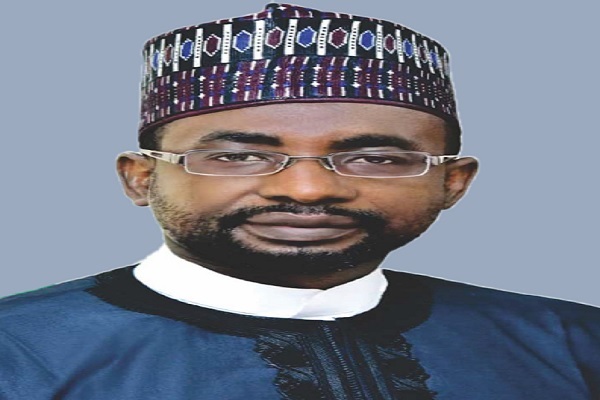Mallam Kashifu Inuwa Abdullahi, director general/CEO, National Information Technology Development Agency (NITDA) runs a series of programmes that support youth empowerment towards Nigeria’s attainment of a digital economy. This is in line with the mission of the agency to create an enabling environment where Nigerians develop, adopt and derive value from digital technology.

In four years of his leadership of NITDA, he has initiated and successfully executed several programmes that empowered close to 30,000 Nigerian youth. The programmes cut across various segments of the youth, touching lives all the way. These include programmes for business start-ups such as Start-Up Friday, Start-Up Clinic, FutureHack.
Other empowerment programmes include Tech4COVID-19 Challenge, capacity building for artisans, girls, women and people living with disabilities.
He has also introduced Technology Innovation and Entrepreneurship Support Scheme that aims to provide opportunities for building capacity for hub owners and start-ups. The objective of the programme is to roll out technology-based entrepreneurs and jobs within the industry.
The agency under Abdullahi has launched NITDA Academy for research and training in support of growth and development functions of a technology-driven economy. This is supported by Virtual Training Programme under which 23,000 participants benefitted in a short space of time.
NITDA’s capacity building programmes include trainings in ICT and digital capacity development for artisans – meant to promote digital economy among the youth. In place also are other skill empowering schemes designed to drive inclusion in the digital economy.
The DG’s focus is on implementing the National Digital Economy Policy and Strategy towards a digital Nigeria. The youth are at the centre of his transformational agenda, rekindling their hopes in the future of the nation’s technology driven economy.
NITDA runs digital economy centres it has created to develop digital skills in educational institutions and rural and underserved areas of the country, thereby enhancing digital jobs. The centre connects schools, libraries and institutions to broadband internet, which has helped to facilitate digital lifestyle in these areas.
Other benefits of the centres include easy access to information in the communities and ability to connect to external communities. Enabling environments are created for nurturing innovation and entrepreneurship and development of training and professional programmes that promote self-employment and entrepreneurship is also made possible.
The agency offers a scholarship scheme with the objective of promoting proficiency in Information Technology at Doctorate and Masters Levels. The scholarships are targeted at two persons per state and the FCT for Masters’ courses and one person per geo-political zone for Doctorate programmes. Through the scheme, the agency is making a remarkable contribution in human capacity building in core areas of Information Technology across Nigeria.

Products of the scheme are rated globally competitive in the area of ICT, which paves the way for job creation in the IT related field and for Nigerian youth to achieve their dreams in this area. This is in support of government’s effort to shift the economy from natural resource-based to knowledge-based.
IT-enabled capacity development is another aspect of NITDA’s youth empowerment activities, which is designed to equip the upcoming generation with adequate knowledge of Information Technology to take advantage of advances in the production of IT goods and services for the advancement of society. This ensures that the youth are provided with IT-enabled capacity that has become the key enabler of economic development.
NITDA also operates fully equipped Information Technology Hubs aimed at addressing the problem of lack of sufficient skilled manpower to drive local content development and industrialisation in the country. It has built IT Hubs in strategic locations across the country to support industry players towards the development of IT for industrialisation. The centres run capacity development programmes for both skilled manpower development and improvement of business and investment climate through improving infrastructures and support services.
The agency provides Virtual Libraries as information resource tools in schools, universities and communities in the country to enable quick, remote and easy access to useful, relevant information. The objective is to provide students, lecturers and researchers with easy access to a wide variety of information resources, provide opportunities for learning that are not possible with physical libraries by providing remote, anytime, anywhere, always-available access to useful and relevant information, improve real time collaborative learning and information exchange, especially for students and research teams.
Other empowerment programmes of the agency include e-Learning Platform, which comes in a number of editions designed to assist with the creation of learning communities by offering various opportunities for collaboration and interaction through an icon-based user interface. The platform offers tools for content creation, test building, assignments management, reporting, internal messaging, forum, chat, surveys, calendar and others.
There is also a Wide Area Network Project, the main objective of which is to provide IT infrastructures to Nigerian tertiary institutions to access broadband internet and other IT services such as IP telephony and IP surveillance systems. The project is aimed at facilitating a digital lifestyle in tertiary institutions.
Abdullahi studied computer science at Abubakar Tafawa Balewa University Bauchi from where he graduated in 2003. He joined Galaxy Backbone Limited, where he worked for nine years, from 2004 – 2013, holding several positions such as Network Engineer, IP Network Field Engineer, Senior Network & Lead, IP Operations Team, and Senior Solution Architect & Lead, Technical Solution Design.
He attended leadership and management courses at various times at Harvard University, Massachusetts, United States; University of Cambridge, United Kingdom and IMD Business School, Switzerland.
He went further to earn several other professional certifications in Project Management, Networking, Telecommunications, Service Management and Solution Design. He is reputed as the first Cisco Certified Internetwork Expert in Nigeria’s public Sector.






